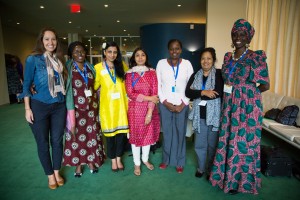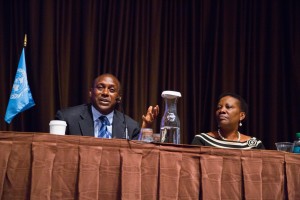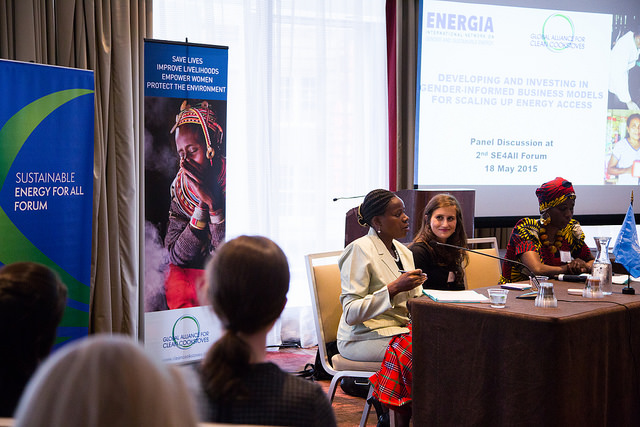It was apparent at the 2015 SE4ALL Forum last week that the topic of gender has finally wedged its way into the energy access conversation. From the multi-stakeholder sessions early in the week, all the way through to the ministerial dialogues in the General Assembly hall at the United Nations, women were mentioned not only as the main victims of the ills of traditional energy sources but also as a viable solution to the problem.
“We have ensured that the gender and energy nexus is now at the top of the energy and development policy agenda” Sheila Oparaocha, ENERGIA’s International Coordinator and Programme Manager, noted during the event.
ENERGIA’s partners in the Women’s Economic Empowerment Programme were representing the gender conversation in panels on Energy for Productive Uses, Gender-Informed Business Models, Clean Cooking Solutions and Women & Children’s Health, as well as participating from the audience in countless other sessions. In contrast, Ms. Oparaocha remembered the early 2000’s, when even years after ENERGIA was founded, gender was still not seen as an important part of the conversation.
“At that point we were trying to talk about gender and it just wasn’t happening. As we have gone forward, what we are beginning to find now is that the conversation is not just an add-on. It’s really seeing gender as critical to meeting the key objectives of sustainable energy. It becomes a normal part of the planning process, of the implementation process. Key mainstream energy actors start seeing that if we don’t include gender it is going to impact the effectiveness and efficiency of our programs,” Ms. Oparaocha noted.
 The gender conversation this year was layered, as are the issues within it. Radha Muthiah of the Global Alliance for Clean Cookstoves and others spoke about the need to include clean cooking as an important topic. The time it takes for women to gather fuel and cook on inefficient traditional cookstoves limits their ability to be productive members of their communities outside their homes. It was noted in the clean cooking session that 2.8 billion people worldwide use solid fuels for cooking and eating, which cause toxic indoor air pollution and have the potential to set homes ablaze.
The gender conversation this year was layered, as are the issues within it. Radha Muthiah of the Global Alliance for Clean Cookstoves and others spoke about the need to include clean cooking as an important topic. The time it takes for women to gather fuel and cook on inefficient traditional cookstoves limits their ability to be productive members of their communities outside their homes. It was noted in the clean cooking session that 2.8 billion people worldwide use solid fuels for cooking and eating, which cause toxic indoor air pollution and have the potential to set homes ablaze.
During the Energy, Women & Children’s Health Session the panelists discussed the need for clean energy in healthcare facilities in the developing world.
“
Post partum hemorrhaging is the largest cause of maternal mortality. It is totally avoidable with available drugs but they require [refrigeration]. Close to 20% of all vaccines in the world are expiring because of the lack of [refrigeration]. There is no less efficient machine than a refrigerator,” noted panelist Maurizio Vecchione . “We can make a machine that doesn’t use that much power but we aren’t bothering to do it.”
During the Gender-Informed Business Models session, panelists agreed that women entrepreneurs are central to spreading clean energy in the developing world. As women are the main managers of energy in the household, who better to sell these new technologies to them than women in their own communities?
“If you aren’t including women in the process you’re not going to sell stoves. You’re not going to have a business model,” noted Jessica Alderman of Envirofit, a cookstove manufacturer.
Corinne Hart of the Global Alliance for Clean Cookstoves added that when women sell cookstoves to their female peers it leads to better adoption of the new stoves than when men sell the same stoves in the same communities.
 The conversation on gender traveled from these topic-specific discussions all the way up to the top, when Special Representative of the Secretary-General & CEO of SE4ALL, Kandeh Yumkella took the stage during the Women & Children’s Health Session on the 20th. He spoke about clean cooking, lack of energy access in health settings and the need for global awareness of these issues.
The conversation on gender traveled from these topic-specific discussions all the way up to the top, when Special Representative of the Secretary-General & CEO of SE4ALL, Kandeh Yumkella took the stage during the Women & Children’s Health Session on the 20th. He spoke about clean cooking, lack of energy access in health settings and the need for global awareness of these issues.
“Lack of energy is a silent killer,” Yumkella noted after mentioning that 4.3 million deaths each year can be attributed to unclean cooking fuel. “We can’t solve that problem without energy efficient cookstoves.”
Even though gender was well represented at this year’s forum, the issues still remain, and there is still much work to do.
“We’re not there yet,” as Ms. Oparaocha noted, “but we have come a long way since ENERGIA started in 1996.”
On the last day of the event, many participants stood to state publicly their commitments to Sustainable Energy for All, many of which included gender-focused aspects. Kicking off the announcements in the morning was the Clean Energy for Life Campaign which seeks to raise awareness about the dangers of traditional cooking methods and increase adoption of clean, sustainable cookstoves. ENERGIA’s partners’ commitments were among those announced during the afternoon of the last day. They each seek to expand energy access for all and to increase integration of women into energy markets globally.
– Solar Sister, committed to growing its network of 1,000 female solar entrepreneurs to 5,000 over the next five years.
– Kopernik, through their Wonder Women Initiative, committed to train 500 additional women to connect live-altering technologies to over 250,000 people in eastern Indonesia by 2017.
– Along with d.light, the Global Off-Grid Lighting Association, Greenlight Planet, Off-Grid Electric, the Sierra Club and Solar Aid, Practical Action has helped to found Power for All. Power for all is an initiative that seeks to bring access to energy to the 85 percent of the 1.2 billion people without reliable power who live in rural areas of the world before 2030. It uses a multi-faceted plan which blends investment, awareness and market-building approaches.
– ENERGIA committed 15 million euro over the next 5 years to programmes providing technical and financial assistance in Asia and Africa, an empirical research programme focused on the value add of a gender perspective in energy investment and a roll out of national level public awareness campaigns to four million people in Asia and Africa.
Hear from the experts about these issues in our interview series here.
Read more about the Energy, Women & Children’s Health Session here.
Follow us on Twitter and Facebook for follow up on the gender conversation at the SE4ALL Forum.







